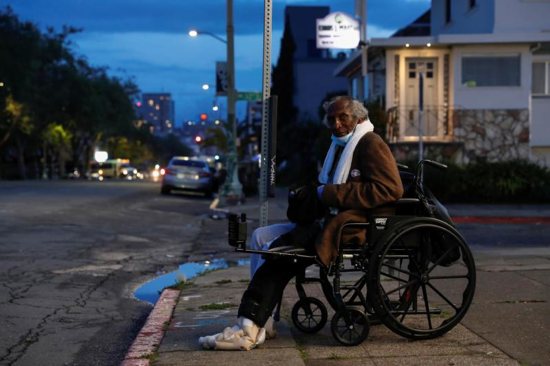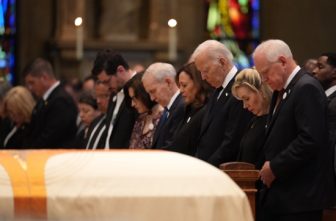
The call to solidarity in Catholic social teaching is “an X-ray in our society that exposes the inequalities in our society, the fragmentation,” said author and columnist David Brooks during an April 6 online forum sponsored by Georgetown University’s Initiative on Catholic Social Thought and Public Life.
“Solidarity is a commandment of virtues. It’s a call to participation,” Brooks said during the forum, “Life and Dignity, Justice and Solidarity: Moral Principles for Responding to the COVID-19 Economic Crisis.” It also is, he added, “a call to serve one another in aggressive ways.”
Catholic social teaching, according to Brooks, is “the most coherent philosophy that opposes a philosophy of rampant individualism.”
“There is a small-D democratizing aspect of a virus. A virus can hit everyone,” said E.J. Dionne, another columnist and author on the panel. ” A virus doesn’t respond to economic incentives. A virus can’t be bought out.”
Dionne added those who have looked askance at “Medicare for all” concepts during presidential primary season may want to reconsider.
“The condition each of us is in absolutely matters to everyone else, including people who have no health care and can’t get in to see a doctor,” Dionne said. “It reminds us that the social and economic division in this country are really deep.”
Maru Bautista, director of the cooperative development program of the Center for Family Life in Brooklyn, New York — which has received Catholic Campaign for Human Development grants in recent years — talked about some of the people in Brooklyn who are not in line to receive any federal help.
“We asked 70 workers last week — asked them how they’re doing, are they losing any income. Sixty of them said they have no income,” Bautista said. These include housekeepers who are unable to go outside their homes. She mentioned the case of one woman from the center’s worker-owned cleaning business who cannot work; her husband was diagnosed with the coronavirus and they have two children at home.
They haven’t been working for three weeks, they have to self-isolate in their own homes,” Bautista said. “It’s very concerning to our organization.”
“Our workers aren’t able to access the federal funds other workers will be getting,” she added, “because there’s lot of barriers to (get to) them.” Bautista said there is a possible way through the pandemic economically, to “create additional lines of business, with training … but that takes time. It’s going to be very challenging. Our communities don’t have the same access to benefits that most people do, but they’re still doing the same work people need them to do.”
Dionne cited a number of jobs critical in a COVID-19-throttled economy. “The folks in the supermarkets, the folks who are keeping these (telecommunications) systems operating … are doing what we ask of them,” he said. “It’s their dignity we should also be thinking about. That crosses class lines from the best doctor to the worst-paid supermarket checkout worker. They’re doing the work we ask them to do.”
Michael Strain, director of economic policy studies at the American Enterprise Institute, said suggesting that “the cure is worse than the disease” does not take into account some sobering economic numbers.
If the United States had allowed the pandemic to run its course, “we would have lost $10 trillion, which would have been akin to shutting down the entire economy for six months. We’ve done the right thing morally, we’ve done the right thing economically,” said Strain, a Catholic.
“This current moment is a setback. This current moment is a challenge,” Strain added. “When this moment passes, they (workers) can continue their upward economic progress, they can continue their upward economic climb. … if the last three decades are any predictor of things to come.”
“When you think of Maru’s reference to those who have no income at all, The SNAP program helps a lot of people, and they spend the money,” Dionne said. “People may be allergic to health care on the Republican side, but if there is ever a time when we told ourselves we need to include people excluded from access to health care, now is the time.”





‘We are in this together’: Recent Supreme Court rulings support parents in their vocation